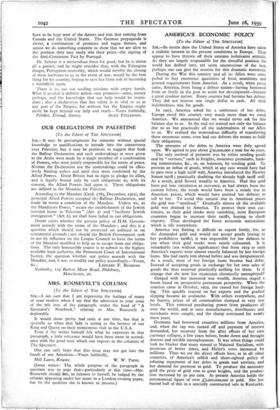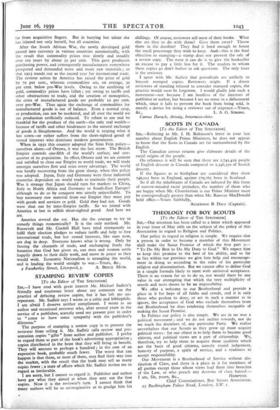AMERICA'S ECONOMIC POLICY [To the Editor of Tim SPECTATOR] SIR, —In
recent days the United States of America have taken a realistic interest in the present conditions in Europe. They appear to have thrown off their extreme isolationist attitude. As they are largely responsible for the dreadful position the world has drifted into, yet seem unconscious of the fact, perhaps one can give the reasons for this dramatic statement.
During the War this country and all its Allies were com- pelled to buy enormous quantities of food, munitions and general requirements from America. As a result, when peace came, America, from being a debtor nation—having borrowed from us freely in the past to assist her development—became a great creditor nation. Every country had become her debtor.
• They did not borrow one single dollar in cash. All their indebtedness was for goods.
In 1923, America asked for a settlement of her debts. Europe owed this country very much more than we owed America. We announced that we would never ask for this balance due to us. In the end we waived not only the balance due to us but practically all the indebtedness of our Allies to us. We realised the tremendous difficulty of transferring these enormous sums, even had our debtors the means to fulfil their obligations.
The amounts of the debts to America were duly agreed upon. We agreed to pay about £30,000,000 a year for 6o years.
The only method of payment was by either sending goods and by " services," such as freights, insurance premiums, bank- ing commissions, &c., or, on balances, by sending gold. To prevent an influx of goods, which in any case would have had to pass over a high tariff wall, America introduced the Hawley Smoot tariff ; practically doubling the already high tariff wall. As a result, gold flowed steadily to America. Had this gold been put into circulation as currency, as had always been the custom before, the result would have been a steady rise in American prices, which would have assisted her debtors to sell to her. To avoid this natural rise in American prices the gold was " sterilised." Gradually almost all the available gold was drained to America. To protect their own cur- rencies, as their gold stocks were vanishing, most European countries began to increase their tariffs, hoping to check imports. Thus developed the fierce economic nationalism which is rife everywhere.
America was finding it difficult to export freely, for, as she demanded gold and would not accept goods (owing to her prohibitive tariffs), it was impossible for her debtors to pay when their gold stocks were nearly exhausted. It is remarkable (not without significance) that from 1919 to 1929 America's exports were almost exactly balanced by her foreign loans. She had rarely lent abroad before and was inexperienced. As a result, most of her foreign loans became bad debts. Instead of accepting goods in exchange for her own sales of goods she thus received practically nothing for them. Is it strange that she now has zo,000poo chronically unemployed?
Gorged with her increased war wealth, America staged a boom based on prospective permanent prosperity. When the reaction came in October, 1929, she ceased her foreign lend- ing. This quickly reacted on her exports and the gradual slipping became an avalanche. With sellers everywhere, and no buyers, prices of all commodities slumped to very low levels. This removed purchasing power from producers all over the world, and at once manufacturers, distributors and merchants were caught, and the slump continued for neatly three years.
Germany had borrowed countless millions from America, and, when the tap was turned off and payment of interest demanded, her recovery from the after effects of her own currency collapse, a few years before, broke down and brought distress and terrible unemployment. It was when things could look no blacker that many turned to National Socialism, with promises of better times, and Hitler's votes increased by millions. Thus we see the direct effects here, as in all other countries, of America's selfish and short-sighted policy of refusing repayment of her debts in goods and services, and her demand for payment in gold. To produce the necessary
gold the price of gold rose to great heights, and the produc- tion increased by 5o per cent. At present America holds the astronomical figure of over £3,00o,000,000 in gold. She has buried half of this in a specially constructed safe in Kentucky,
far from acquisitive fingers. But in burying her talent she has injured not only herself, but all countries.
After the South African War, the newly developed gold passed into currency in various countries automatically, with the result that commodity prices rose slowly and steadily over ten years by about 5o per cent. This gave producers purchasing power, and consequently manufacturers everywhere prospered and demanded more and more raw materials ; so that 1913 stands out as the record year for international trade. The reverse action by America has raised the price of gold by 70 per cent., whereas commodities are, on average, 3o per cent. below pre-War levels. Owing to the sterilising of gold, commodity prices have fallen ; yet owing to tariffs and other obstructions to trade, and the creation of monopolies, the costs of manufactured goods are probably to per cent. over pre-War. Thus again the exchange of commodities for manufactured goods is out of balance. Even a normal crop, or production, can not be marketed, and all over the world we see production artificially reduced. To refuse to use and be thankful for the produce of the earth—the only real wealth— because of tariffs and other hindrances to the natural exchange of goods is blasphemous. And the world is reaping what it has sown—or rather suffers from the short-sighted greed of vested interests who dominate modern governments.
When in 1932 this country adopted the Sinn Fein policy— ourselves alone—of Ottawa, it was the last straw. The British Empire controls one-fifth of the world's surface, and one- quarter of its population. In effect, Ottawa said we are content and satisfied to close our Empire to world trade, we will trade amongst ourselves first and seize every advantage. The world was hardly recovering from the great slump, when this policy was adopted. Japan, Italy and Germany were three industrial countries dependent on world trade to maintain their people. Was it strange that Japan should turn for markets to China, Italy to North Africa and Germany to South-East Europe? although to do so by conquest was utterly unjustifiable. To buy necessary raw material from our Empire they must pay with goods and services or gold. Gold they had not. Goods were shut out by inter-Empire tariffs. So we joined with America at last in selfish short-sighted greed. And here we are.
America started the rot. Has she the courage to try to remedy things economically? It is the only method. Mr. Roosevelt and Mr. Cordell Hull have tried strenuously to fulfil their election pledges to reduce tariffs and help to free international trade, but her vested interests, like ours now, are dug in deep. Everyone knows what is wrong. Only by freeing the channels of trade, and exchanging freely the bounties that God has given us, can men and women settle happily down to their daily work, and move in peace as they would wish. Economic Nationalism is strangling the world, and is leading the world straight to war.—Yours, &c.,
4 Fazakerley Street, Liverpool, 3. A. BRYCE MUIR.























































 Previous page
Previous page